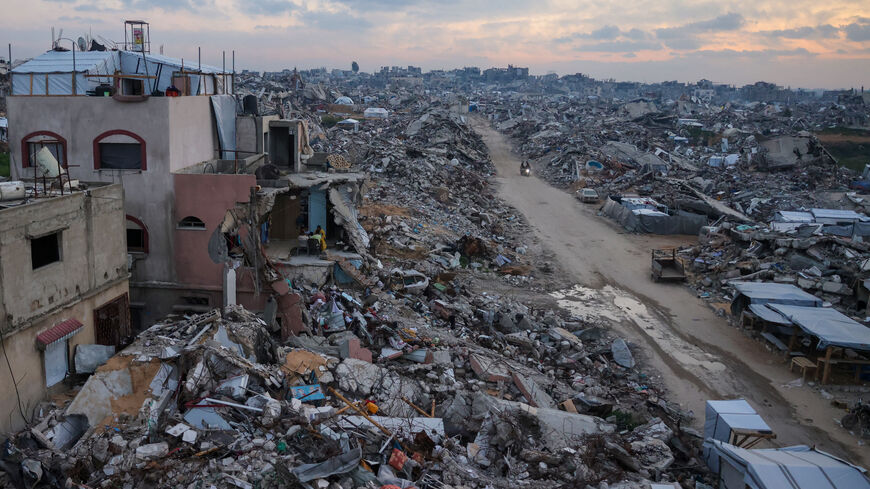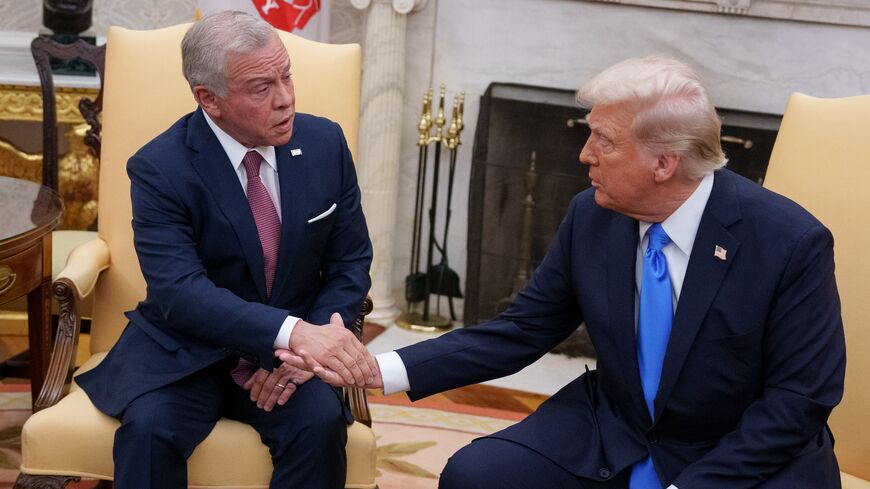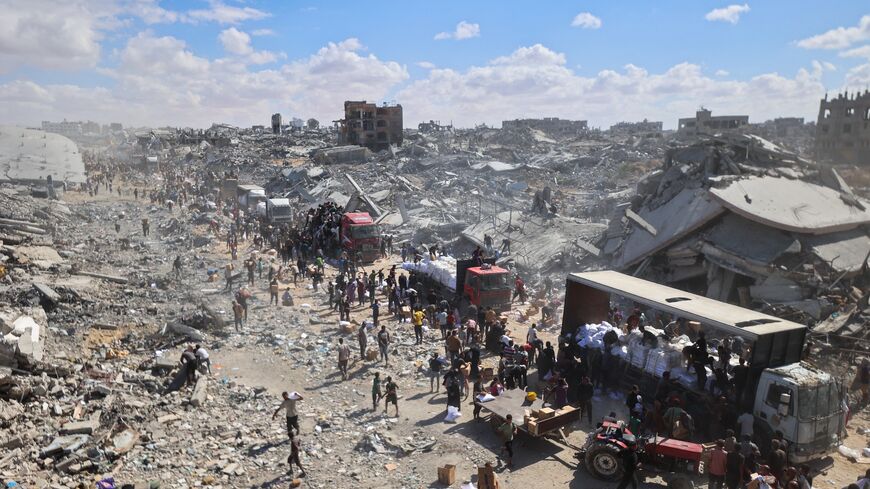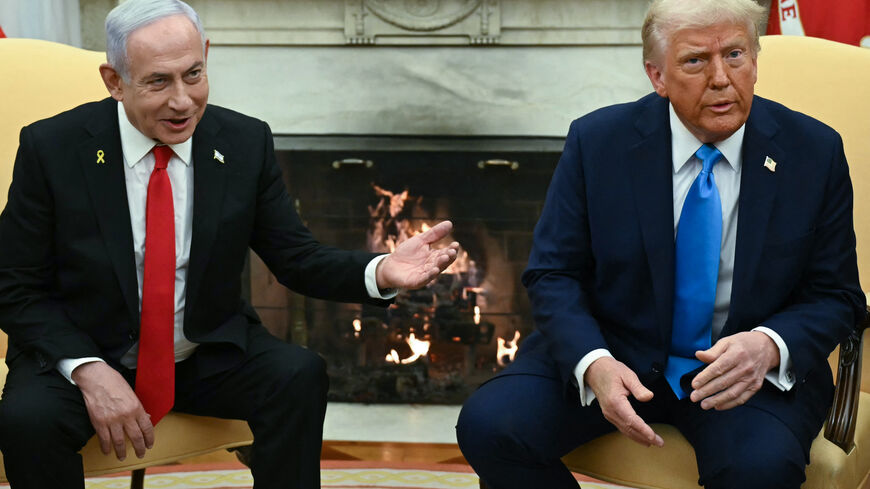Meeting with Netanyahu, Trump calls for removal of Palestinians from Gaza
Prior to the bilateral meeting, the White House tried to put a humane spin on Trump's outlandish proposal, which critics and historians have likened to ethnic cleansing.
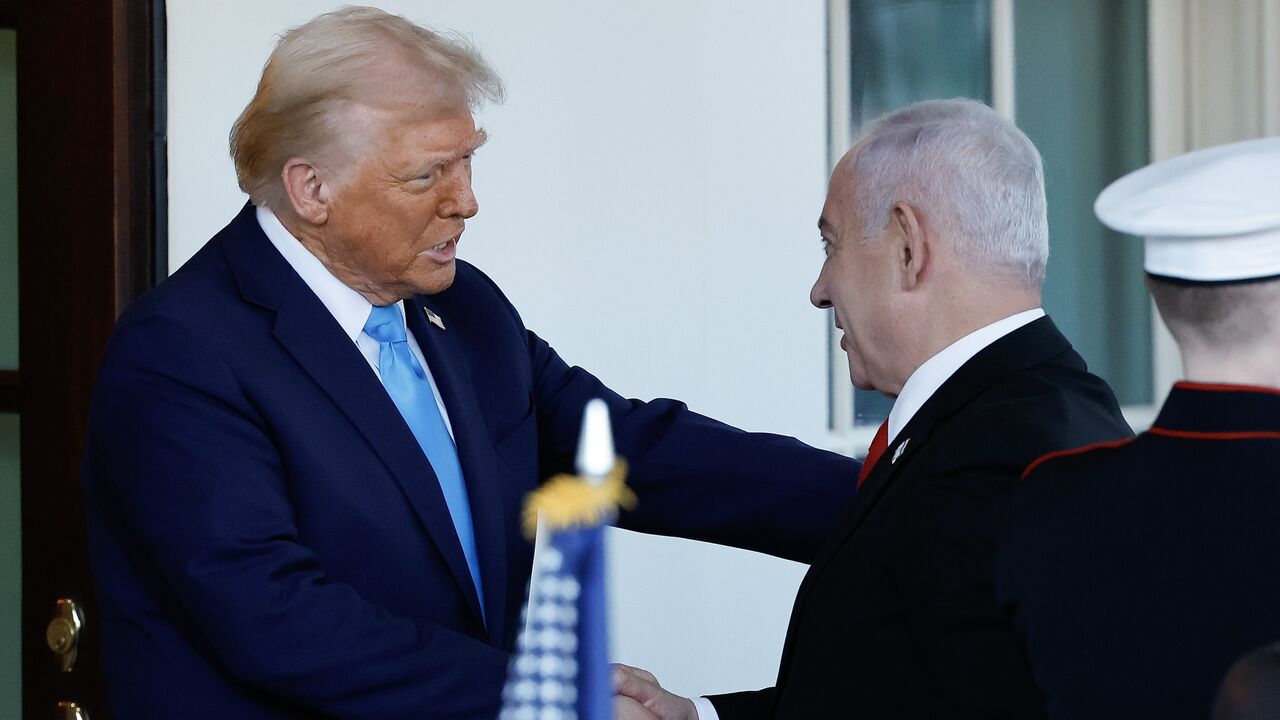
WASHINGTON — US President Donald Trump called for the near total removal of the Palestinian population from Gaza on Tuesday and said the US would “take over” the enclave, leaving open the possibility of sending American troops to do so.
Trump did not say what legal authority the US has to take over the enclave, nor did he offer any specifics as to how it may be carried out. “I do see a long-term ownership position and I see it bringing great stability to that part of the Middle East,” he said in the press conference after his meeting with the Israeli leader.
Netanyahu appeared to endorse Trump’s idea following their meeting.
“He has a different idea, and I think it’s worth paying attention to… I think it’s something that could change history, and it’s worthwhile,” Netanyahu said.
‘Cleaning out Gaza’
Prior to their meeting on Tuesday, Trump doubled down on his earlier suggestions that he would press neighboring countries to accept the large numbers of displaced people among the Gaza Strip’s population.
The remarks led to a firestorm of criticism in the Arab world and allegations that the president supports de facto ethnic cleansing in the narrow seaside enclave.
The UN's International Criminal Court ruled that Palestinians' rights to protection from genocide were plausible and issued preliminary measures meant to protect these rights. Netanyahu remains a fugitive from the ICC for alleged decisions that led to alleged crimes against humanity in the Palestinian enclave.
More than 80% of Gaza's buildings have been destroyed and more than 47,000 people killed, the majority of them women and children.
“They have no alternative right now,” the president said of Gaza’s population of 2.2 million people. “I mean, they’re there because they have no alternative. What do they have? It is a big pile of rubble right now,” he added. “I don’t know how they could want to stay. It’s a demolition site.”
The governments of both Egypt and Jordan swiftly rejected the idea in statements over the weekend. Five Arab countries and the secretary-general of the Arab League also released a joint statement on Saturday squarely rejecting any plan to displace Palestinian inhabitants from the enclave as “ethnic cleansing.”
Yet White House officials sought to put a humanitarian spin on the president’s proposal ahead of Netanyahu’s state visit on Tuesday.
Trump’s Middle East envoy, former real estate investor Steve Witkoff, became the first senior American official to visit Gaza in 15 years when he reached the Netzarim Corridor with Israeli escorts last week.
The devastation wrought by the Israeli military upon Gaza reportedly made an impression on the envoy. Witkoff came away convinced that the five-year timeline suggested by former President Biden’s May 2024 ceasefire proposal was insurmountable, White House officials said.
“I would push back on the characterization of ‘cleaning out’ Gaza,” US national security adviser Mike Waltz said to a reporter outside the White House ahead of the bilateral meeting on Tuesday. “I think President Trump is looking at this from a humanitarian standpoint,” Waltz added.
“You have these people who are sitting with literally thousands of unexploded ordnance in piles of rubble,” he said. “That’s what we’ll work through with Prime Minister Netanyahu,” he said.
Witkoff also sought to defend Trump’s prior suggestion ahead of the meeting with Netanyahu. “When the president talks about cleaning it out, he talks about making it habitable. And this a long-range plan. … As to where people will go, that’s a big issue, and we have to solve that. And that’s what we’re here to do.”
Trump on Tuesday said he believes unspecified “other countries” will accept refugees from Gaza. “You could build four or five or six areas,” Trump said. “You build really good quality housing, like a beautiful town, like some place where they can live and not die, because Gaza — it’s a guarantee that they’re going to end up dying. The same thing is going to happen again.”
The US president further claimed that “many countries, many leaders of countries” had “reached out that would like to participate. It doesn’t have to be Jordan and Egypt."
He waved off a journalist's question about whether he supports a return of Israeli settlements to Gaza, suggesting the enclave was uninhabitable.
Sitting before the cameras in the Oval Office alongside Trump later on Tuesday, Netanyahu neither endorsed nor pushed back on the president’s suggestion.
The Israeli prime minister underscored that he remains committed to the return of all hostages from Gaza as well as to achieving all of Israel’s military objectives there — including preventing the militant group from ever staging another attack on Israel, implying a potential continuation of the war.
Netanyahu further suggested that Trump can assist with those objectives. “I think the president can help enormously,” the prime minister said.
Asked by a reporter whether he supports “Trump’s vision for getting all the hostages back home, even if it means an end to the war?,” Netanyahu responded, “Well, I’m not sure that you articulate correctly what the president’s vision is. He can speak for himself. He does that very, very well.”
Trump made no commitment with regard to the ceasefire in his comments following the meeting. He also did not specify whether Netanyahu had committed to upholding the ceasefire, although White House officials said earlier on Tuesday that he was expected to engage the Israeli prime minister on the issue.
“We’re in phase two now,” Witkoff told reporters on Tuesday outside the White House.
Witkoff added that he will meet with Qatar’s prime minister in Florida on Thursday to further cement the truce. “We’re dug in,” he said.
The president's earlier suggestion that he would pressure the leaders of Egypt and Jordan to take Palestinian refugees from Gaza drew rare praise from Netanyahu’s extreme right-wing coalition allies.
“Donald, this looks like the beginning of a beautiful friendship,” Netanyahu’s former security minister, Itamar Ben-Gvir, tweeted following the president’s comments on Tuesday evening.
Jordan’s King Abdullah II is expected to meet with Trump at the White House next week on the heels of the Israeli prime minister’s visit.
“We’re looking to a number of our allies, partners in the region. We have to collectively solve this problem,” Waltz told reporters ahead of the Netanyahu meeting.
Any large-scale displacement of Palestinian refugees into neighboring Jordan is likely to exacerbate the country’s fragile economy and would almost certainly trigger widespread unrest, which could threaten the Hashemite dynasty's hold on power. Already, Jordanian officials have been closely eyeing increasing violence in the adjacent West Bank.
Trump spoke again with Egypt’s leader, Abdel Fattah el-Sisi, on Saturday.
“I think the president is driving practical, common-sense solutions to what is admittedly a very difficult situation,” Waltz said.

